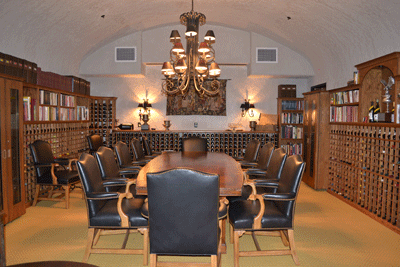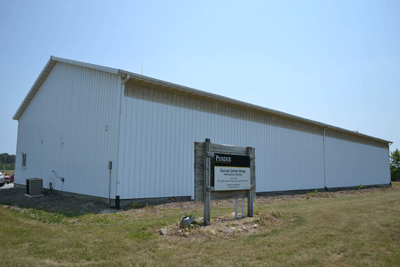Purdue Wine Grape Facilities
Enology
Publications
Commercial Winemaking Production Series: Chlorine Use in the Winery
2010, Purdue Extension publication FS-50-W (382 KB, PDF)
Commercial Winemaking Production Series: Cork Quality Control
2010, Purdue Extension publication FS-55-W (298 KB, PDF)
Commercial Winemaking Production Series: Fining with Bentonite
2010, Purdue Extension publication FS-53-W (424 KB, PDF)
Commercial Winemaking Production Series: Preventing Refermentation
2010, Purdue Extension publication FS-56-W (306 KB, PDF)
Commercial Winemaking Production Series: Traminette Winemaking
2010, Purdue Extension publication FS-59-W (711 KB, PDF)
Commercial Winemaking Production Series: Treatment of Film Yeasts
2010, Purdue Extension publication FS-51-W (664 KB, PDF)
Commercial Winemaking Production Series: Use of SO2 in High-pH Wines
2010, Purdue Extension publication FS-52-W (674 KB, PDF)
Commercial Winemaking Production Series: Wine Barrel Maintenance
2010, Purdue Extension publication FS-57-W (358 KB, PDF)
Commercial Winemaking Production Series: Wine Cold Stability Issues
2010, Purdue Extension publication FS-54-W (466 KB, PDF)
Commercial Winemaking Production Series: Wine Storage Guidelines
2010, Purdue Extension publication FS-58-W (396 KB, PDF)
“Concentration of Primary Amino Acids in Grape Juice: NOPA Procedure”
1998 (42 KB, PDF)
Cork Sensory Quality Control Manual
1998, University of California publication 21571
Ethyl Carbamate Preventative Action Manual
1997, University of California, Davis Cooperative Extension
Wine Appreciation
2010, Kendall Hunt Publishing
Wine Aroma Descriptor Manual
2008, former Purdue Extension publication FS-15 ()
Winemaking Problems Solved
2010, Woodhead Publishing
Videos
The Purdue Wine Grape Team enology lab is managed by Jill Blume, enology specialist. The lab provides complimentary quality assessment services to the Indiana wine industry. The services include wine analyses and sensory evaluations. As part of its quality system, the lab participates in the ASEV-CTS wine laboratory proficiency testing program.
 The Richard P. Vine Enology Library houses a vast anthology of international wine books, including J.J. Dufour's original American Vine-Dresser's Guide from 1826 and a precious collection of hundreds of bottles of fine wines from around the world. The library was established in 1998 and is supported by a generous donation from vintner Fred Franzia and the Bronco Wine Company.
The Richard P. Vine Enology Library houses a vast anthology of international wine books, including J.J. Dufour's original American Vine-Dresser's Guide from 1826 and a precious collection of hundreds of bottles of fine wines from around the world. The library was established in 1998 and is supported by a generous donation from vintner Fred Franzia and the Bronco Wine Company.
The Purdue Wine Grape Team pilot winery features commercial-grade winemaking equipment and is used for two main purposes: to provide undergraduate and graduate students hands-on learning about commercial winemaking practices, and to produce experimental wines from varietal grape growing trials at the Purdue Agricultural Centers. The finished wines are presented every year at the Indiana Horticultural Congress to professional winegrowers to assist them in future planting decisions.
Purdue Horticulture and Landscape Architecture has a state-of-the-art greenhouse and plant growth facility for research. It is used for propagation and viticulture studies.
Bruce Bordelon and Peter Hirst, professor and associate professor of horticulture, share a modern research lab suitable for detailed bench studies or whole plant research.
The Southwest Purdue Agricultural Center (SWPAC) near Vincennes is home to the southernmost research vineyards in Indiana. The climate at this location is representative of much of the southern third of the state, which has more than half of Indiana’s commercial vineyards. It has a mild winter (USDA Plant Hardiness Zone 6) and long growing season (3,750 growing degree days) suitable for producing late-ripening varieties. SWPAC has had trials for 20 years and more than 70 varieties have been evaluated for adaptation to this region. We are currently evaluating a number of hybrid and vinifera varieties with plans to expand the vinifera plantings in the near future.
The Throckmorton-Purdue Agriculture Center (TPAC) near Lafayette is home to the Meigs Memorial Horticulture Research Farm, a 240-acre, fully irrigated tract designed for specialty crop and organic production research. The Meigs facility has a state-of-the-art pesticide handling facility, a full spectrum of specialty crop equipment, and several high tunnels. The climate at this location is representative of the northern half of the state, which has the challenges of extreme minimum winter temperatures (USDA Plant Hardiness Zone 5) and a short growing season (2,850 growing degree days) suitable for early and midseason ripening varieties. We have four acres of research vineyards at this location that include a 30-variety replicated trial, training system study on Traminette, evaluation of crown gall-free planting stock, and observation plots for dozens of advanced selections from the nation’s leading breeding programs.

Samuel Gilman Meigs Horticultural Facility. Part of the Throckmorton-Purdue Agricultural Center.
